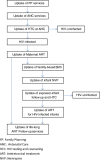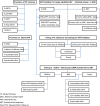Building a national direction for research in the prevention of mother to child transmission of HIV: results from a national prioritization initiative in Malawi
- PMID: 24161044
- PMCID: PMC4231351
- DOI: 10.1186/1478-4505-11-40
Building a national direction for research in the prevention of mother to child transmission of HIV: results from a national prioritization initiative in Malawi
Abstract
Background: In 2011, Malawi initiated an ambitious program for the prevention of maternal to child transmission (PMTCT) of HIV, called 'Option B+,' which employs a universal test and life-long treatment strategy for all pregnant women. Priority setting should take place in defining a national research agenda for evaluating Option B + rollout in Malawi.
Methods: In April 2011, a three-day workshop took place for all major stakeholders in PMTCT aiming to provide an update on current PMTCT operational research in Malawi, find consensus on key questions not yet being addressed, identify opportunities for collaboration, and develop multi-partner research proposals.
Results: Overall, 24 participants attended the workshop including representatives from the Ministry of Health, the National AIDS Commission and 12 multilateral, non-governmental organizations and academic partners.Three interrelated clusters emerged as priorities for research: i) pregnancy intentions and family planning needs; ii) evaluation of models of care; and iii) determinants of uptake, adherence, and retention of women for Option B+. In addition, two cross-cutting themes arose: partner involvement in PMTCT services and cost-effectiveness as a guide to priority setting. Within each cluster a coordinator was designated and a proposed plan for research and potential collaborators were discussed. The results of the workshop were presented to the national technical working groups and the National AIDS Commission. Several large-scale, collaborative proposals have been developed and funded to address the research areas defined.
Conclusions: Option B + represents a significant change in PMTCT policy in Malawi and the process for evaluation of the Malawi PMTCT strategy is outlined. This workshop contributed to defining and coordinating the national agenda for research priorities.
Figures
References
-
- UNAIDS. Global Report: UNAIDS Report on the Global AIDS Epidemic. Geneva: UNAIDS; 2012.
-
- Newell ML, Coovadia H, Cortina-Borja M, Rollins N, Gaillard P, Dabis F. Ghent International AIDS Society (IAS) Working Group on HIV Infection in Women and Children. Mortality of infected and uninfected infants born to HIV-infected mothers in Africa: a pooled analysis. Lancet. 2004;364:1236–1243. doi: 10.1016/S0140-6736(04)17140-7. - DOI - PubMed
-
- Schouten EJ, Jahn A, Midiani D, Makombe SD, Mnthambala A, Chirwa Z, Harries AD, van Oosterhout JJ, Meguid T, Ben-Smith A, Zachariah R, Lynen L, Zolfo M, Van Damme W, Gilks CF, Atun R, Shawa M, Chimbwandira F. Prevention of mother-to-child transmission of HIV and the health-related Millennium Development Goals: time for a public health approach. Lancet. 2011;378:282–284. doi: 10.1016/S0140-6736(10)62303-3. - DOI - PubMed
-
- Tippett Barr B, Mhango E, Tenthani L, Zomba G, Makombe S, Eliya M, Midiani D, Gupta S, Chimbwandira F, Jahn A. Uptake and Retention in Malawi’s Option B+ PMTCT Program: Lifelong ART for All HIV+ Pregnant or Lactating Women. Atlanta: Conference on Retroviruses and Opportunistic Infections (CROI); 2013. http://www.thebodypro.com/content/71680/uptake-and-retention-in-malawis-....
MeSH terms
Substances
LinkOut - more resources
Full Text Sources
Other Literature Sources
Medical
Miscellaneous



